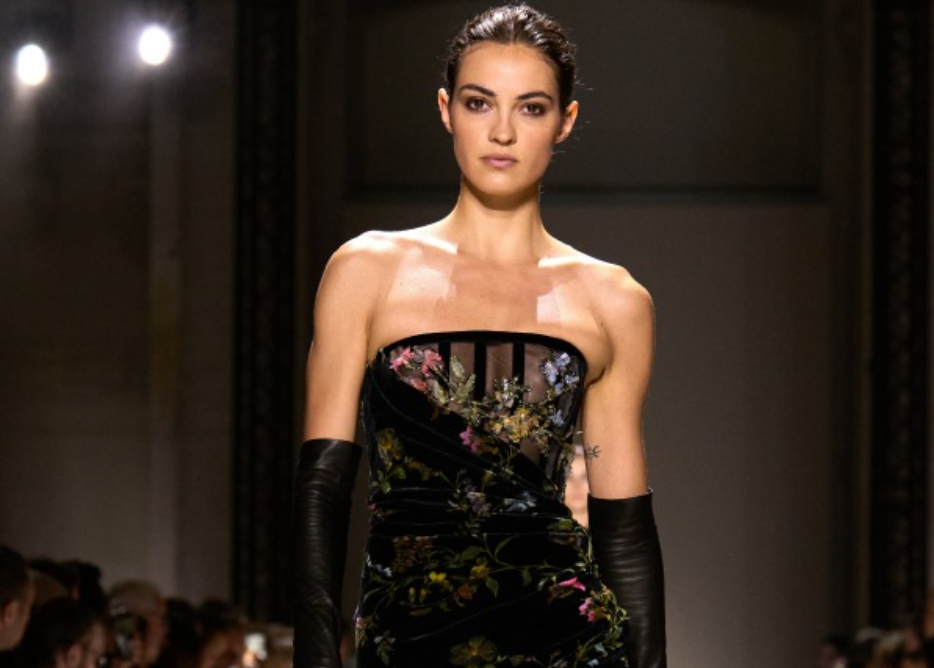
The 24-year-old model became famous after she posted a heartfelt Instagram post about being detained for 24 hours at an Italian airport for what appeared to be nothing more than the color of her skin. Here, she recounts this experience and points out why society needs to do more to combat discrimination
Black British model Kukua Williams, 24, has collaborated with Celine, Erdem and Jil Sander. She was detained at an Italian airport during Milan Fashion Week and later posted a photo of herself taken at the time.
In the caption to the photo, which went viral on March 7, she described how shaken she was by the experience: "I shared this photo to shine a light on the issues black models face in the industry - issues that the average person doesn't or doesn't face."
The comments below the post prove that this is not an isolated case.
Here, Williams recounts her experience on that day and highlights what needs to change in the fashion industry and beyond to end racism once and for all.
I hadn't been modeling for very long when I encountered racism in the fashion industry. I was working with another non-black model.
The team would refer to her by her name and to me by 'the black girl.' At the time, I began to question my worth: Was my only job there to meet the diversity quota?
Every black model has a limit to what they can endure, and it could be having their hair handled inappropriately countless times, or being pulled over by the police on their way to a casting call, or having their name mispronounced over and over again.
My patience reached its limit during the Fall/Winter 2021 Milan Fashion Week, when I was unjustifiably detained for 24 hours at an Italian airport.
This may seem shocking to some, but for black models, it may be the norm.
I was prepared to have my credentials thoroughly checked and to be questioned about my reasons for traveling during the pandemic (casting for a job).
But what I didn't expect was that I would be denied entry to a country seemingly simply because of the color of my skin.
My credentials were in order and the non-black models from my agency completed the same trip as me a few days ago and they had no problems.
During the 24 hours I was detained, I was told that no one was allowed to enter Italy from the UK except Italian citizens.
The authorities refused to see the letter from the agency I was carrying (even though all the other models were carrying the same letter) and told me that attending the casting was not a good enough reason to enter the country.
They wouldn't let me use my phone and they confiscated my passport. The next day I was put on a plane back to England in a police car as if I were a prisoner. I was traumatized by the experience.
There is no loss of face in responding positively to racism. If anyone wants to know privately about the discrimination black models face, there's plenty to learn just by asking us - but it's not our job to find solutions.
When I was detained, I had to find out and understand for myself why it happened. I feel that when race can be used as a 'cause', it means that the dialogue between races has not yet begun.
While the fashion industry is finally becoming more inclusive -- at least on camera -- the progress has been limited.
Racism is rampant all over the world, which means the world is not a safe place for people of color, and the fashion industry is not an arcadia, it is part of that world.
I'm not the only one born with a fear of walking through airport checkpoints because of the possibility of being stopped and frisked or detained.
There needs to be greater transparency around the issue of racism, not just private complaints and gossip among other models who care about the issue.
When people of color speak out against racism in person, we're often accused of making everything about race, as if we're playing the invisible 'race card.'
I've heard it many times, and it's always used by ignorant people to express disgust, as if to say, "It's so lame that a black model is making everything about race again."
I didn't wake up in the morning with the goal of being racially abused [6] - it happened naturally when I was in an industry that needed me to get out into the real world, where there was no one to protect me.
The obvious racial bias I encountered that day wasn't just 'bad luck,' but the world shouldn't have waited for me to become a social media sensation to recognize it.
Black models should not be afraid to talk about these kinds of experiences for fear of repercussions on their future careers. We need to be bold and say, "I am being treated this way because of my race and the color of my skin." It may be uncomfortable, but it's the only way to make progress.
I love and embrace my race, and I am proud of it; I shouldn't have to defend my race. The world needs to unite. Non-people of color in the fashion industry and beyond -- now it's your turn to fight for us.

